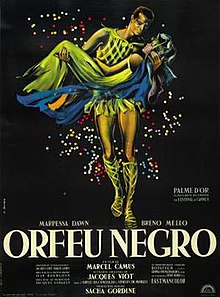cross-posted from: https://kbin.social/m/13thFloor/t/468313
Black Orpheus (Portuguese: Orfeu Negro [ɔɾˈfew ˈneɣɾu]) is a 1959 romantic tragedy film directed by French filmmaker Marcel Camus, and starring Marpessa Dawn and Breno Mello. It is based on the play Orfeu da Conceição by Vinicius de Moraes, which set the Greek legend of Orpheus and Eurydice in a contemporary favela in Rio de Janeiro during Carnaval. The film was an international co-production among companies in Brazil, France and Italy.
The film is particularly noted for its soundtrack by two Brazilian composers: Antônio Carlos Jobim, whose song "A felicidade" opens the film; and Luiz Bonfá, whose "Manhã de Carnaval" and "Samba de Orfeu" have become classics of bossa nova. The songs performed by Orfeu were dubbed by singer Agostinho dos Santos.[6] Lengthy passages of filming took place in the Morro da Babilônia, a favela in the Leme neighbourhood of Rio de Janeiro.
Black Orpheus won the Palme d'Or at the 1959 Cannes Film Festival, the 1960 Academy Award for Best Foreign Language Film, the 1960 Golden Globe Award for Best Foreign Film and was nominated for the 1961 BAFTA Award for Best Film.
Important to note, there's some controversy over the film in Brazil:
While the 1959 adaptation has been celebrated internationally, it has been criticized by Brazilians and scholars for exoticizing Brazil for an international audience and reinforcing harmful stereotypes.
and...
The Palme d'Or and Oscar-winning film was celebrated internationally and criticized in Brazil; Vinicius de Moraes, author of the play Orfeu da Conceição upon which the film was based, was outraged by the film and left the theater in the middle of the screening. Critics of the adaptation by Marcel Camus argued that it reinforced various stereotypes about Brazilian culture and society and about Afro-Brazilians specifically, portraying the characters as "simple-minded, overtly sexual, and interested only in singing and dancing." Setting out to make itself more "appealing" to foreign audiences, the film resorts to a "cheap and problematic exoticism" of Brazil.
This movie is an explosion of cinematic joy de vivre, unique in the energy it brings to a classic tragedy, and a unique picture of Brazil in the late 50s, I've decided to let the audience decide where their opinions sit in the controversy above.
Captions in English available in settings -> captions on the player for those that don't speak Portuguese.
